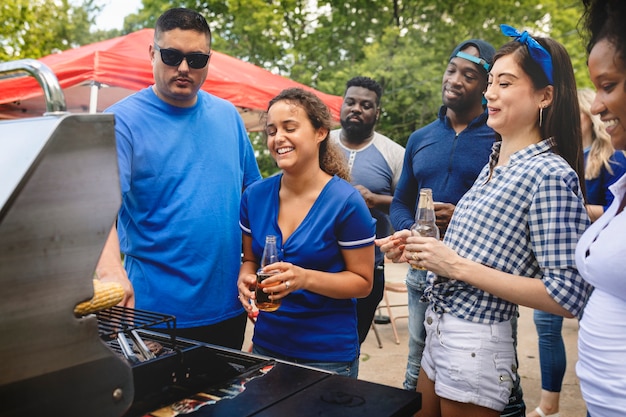Why does electric grill smoke so much?
An electric grill is a convenient and efficient way to cook delicious meals indoors, especially in the UK where weather conditions may not always allow for outdoor grilling. However, one common issue that some users encounter is excessive smoke during the grilling process. Understanding why electric grills smoke so much can help you find ways to minimize it and enjoy a smoke-free cooking experience.
The Role of Dripping Fat and Grease
One of the main reasons why electric grills produce smoke is the dripping fat and grease from the food being cooked. As the fat and grease come into contact with the heating element or hot surface of the grill, they can cause smoke to rise. This is particularly true when grilling fatty meats or marinated dishes, as they tend to release more drippings during the cooking process.
To reduce smoke caused by dripping fat and grease, it is recommended to trim excess fat from meats before grilling or use leaner cuts that produce less drippings. Additionally, placing a drip tray or foil underneath the grill can catch the drippings and prevent them from coming into direct contact with the heating element.
Burnt Food Residue and Seasoning
Another factor that contributes to smoke production on electric grills is burnt food residue and seasoning. Over time, these residues can accumulate on the grill’s heating element or cooking surface, leading to smoke when the grill is in use.
To prevent this, regular cleaning and maintenance of your electric grill are essential. Remove any excess food debris or seasoning remnants after each use and deep clean the grill as needed. Keeping the grill surface free from buildup will help minimize smoke and ensure optimal grilling performance.
Temperature and Cooking Method
The temperature at which you are grilling and the cooking method can also affect the amount of smoke produced. When using high temperatures or searing foods, there is a higher likelihood of smoke generation due to the intense heat and the potential for fat and grease to drip onto the heating element.
Try adjusting the temperature settings on your electric grill to a lower heat for slower cooking, which can reduce smoke production. Additionally, consider using cooking methods that require less direct contact with the heating element, such as using a grilling tray or baking sheet to prevent excessive drippings.
Proper Ventilation
Ensuring proper ventilation in your cooking area is crucial when using an electric grill. Smoke produced during the grilling process needs to be vented out to prevent it from accumulating indoors. If your electric grill is equipped with a vent or hood, make sure to use it and keep it clean to maintain good airflow.
Consider grilling near a window or using an extractor fan to further enhance ventilation and reduce smoke. Adequate ventilation not only helps eliminate smoke but also prevents any lingering odours in your kitchen.
In Summary
Understanding the reasons behind excessive smoke production on electric grills can help you take necessary precautions and minimize the issue. By managing dripping fat, keeping the grill clean, adjusting cooking temperatures, and ensuring proper ventilation, you can significantly reduce smoke and enjoy a pleasant grilling experience with your electric grill.
Why is my electric grill not staying hot?
Electric grills are a convenient and efficient way to cook delicious meals, but sometimes they may not stay hot as expected. This can be frustrating, especially when you are in the middle of cooking a mouth-watering steak or grilled vegetables. There are several reasons why your electric grill may not be staying hot, and understanding these factors can help you troubleshoot and resolve the issue.
1. Power supply issues
One possible reason for your electric grill not staying hot is power supply problems. Ensure that the grill is plugged into a reliable power source and that the outlet is working correctly. If the outlet is connected to a GFCI (Ground Fault Circuit Interrupter), make sure it hasn’t tripped. Additionally, check if there are any loose connections between the grill and the power cord.
2. Thermostat malfunction
A faulty thermostat can cause the electric grill to not stay hot. The thermostat is responsible for regulating the temperature, so if it is not working properly, the grill may not reach or maintain the desired heat. You can try resetting the thermostat or replacing it if necessary.
3. Insufficient preheating
Proper preheating is crucial for an electric grill to reach and maintain the desired temperature. If you don’t give your grill enough time to preheat, it may not stay hot. Follow the manufacturer’s instructions on preheating times, and ensure that the grill has reached the recommended temperature before placing your food on the cooking surface.
4. Ventilation issues
Adequate ventilation is essential for an electric grill to function optimally. If the vents or air intakes are blocked or clogged, it can lead to poor heat circulation and consequently, a grill that does not stay hot. Clean the vents regularly and ensure they are free from any obstructions.
Remember, if you are unsure about diagnosing and resolving the issue with your electric grill, it is always best to consult the manufacturer or a professional technician. They will be able to provide you with specific guidance based on the make and model of your grill.
Why does my electric grill turn off?
Electric grills are a popular and convenient option for many people, offering a quick and easy way to cook delicious meals indoors or outdoors. However, it can be frustrating when your electric grill unexpectedly turns off during use. There are several common reasons why this may happen:
1. Overheating
One possible reason for your electric grill turning off is overheating. Electric grills have built-in safety mechanisms that shut off the power if they reach a certain temperature to prevent damage or fire hazards. To avoid this, make sure you’re using your grill in a well-ventilated area and not blocking any air vents.
2. Faulty Power Connection
If your electric grill repeatedly turns off, check the power connection. Ensure that the plug is securely inserted into the outlet and that there are no loose connections. If the cord or plug is damaged, it’s advisable to replace them to prevent any electrical mishaps.
3. Tripped Circuit Breaker
Another possible cause for your electric grill turning off is a tripped circuit breaker. When the grill draws too much power, it can overload the circuit and trip the breaker, cutting off the electricity supply. Check your circuit breaker panel and reset any tripped breakers if necessary.
4. Timer or Auto Shut-off Function
Many electric grills come with built-in timers or auto shut-off functions. If your grill turns off after a specific amount of time, it may be because the timer has expired. Refer to your grill’s manual to adjust or disable these functions if desired.
In conclusion, there are several reasons why your electric grill may turn off, including overheating, faulty power connections, tripped circuit breakers, or timer and auto shut-off functions. By addressing these potential issues, you can enjoy uninterrupted grilling sessions and make the most of your electric grill.
Why Does My Grill Keep Dying?
Grilling is a popular activity for many people in the UK, especially during the summer months. However, it can be frustrating when your grill keeps dying and interrupting your cooking sessions. There are several possible reasons why this might be happening.
1. Fuel Issues
One common reason for a grill to keep dying is fuel-related issues. Make sure you have enough fuel, whether it’s charcoal or propane, and that it is properly ignited. If using propane, check if the tank is empty or if there are any leaks.
2. Ventilation Problems
Another factor that can cause a grill to die is inadequate ventilation. Grills need oxygen to sustain a flame, so if the vents are blocked or closed, it can lead to insufficient airflow. Check that the vents are open and not obstructed by debris.
3. Clogged Burners
Clogged burners can also result in a grill dying. Over time, grease and food particles can accumulate on the burners, obstructing the flow of gas and affecting the flame. Clean the burners regularly to maintain proper functioning.
4. Malfunctioning Regulator
A faulty regulator can disrupt the flow of gas from the propane tank, causing the grill to die. Inspect the regulator for any signs of damage or leaks. If necessary, replace it to ensure a consistent fuel supply.
5. Extreme Weather Conditions
Extreme weather conditions, such as strong winds or heavy rain, can also extinguish a grill flame. When grilling outdoors, try to find a sheltered spot or use wind shields to protect the flame from gusts. Consider using a grill cover to shield your equipment from rain.
Remember, safety is crucial when dealing with grills. Always follow the manufacturer’s instructions and ensure proper ventilation to prevent the risk of carbon monoxide buildup or fire hazards.
Why Would a Grill Stop Working?
Grills are an essential part of outdoor cooking, especially in the UK where barbecues are a popular summer activity. However, just like any other appliance, grills can stop working for various reasons. Understanding why your grill may have stopped working can help you troubleshoot and fix the issue, ensuring that you can get back to grilling delicious meals in no time.
1. Propane or Gas Supply Issues
If your grill runs on propane or gas, a common reason for it to stop working is an issue with the fuel supply. Check if the propane tank is empty or the gas line is properly connected. If the tank is empty, simply replacing it will solve the problem. For gas grills, ensure the gas valve is open and that there are no leaks in the supply line.
2. Ignition Problems
Another reason for a grill to stop working could be ignition problems. If you have a gas grill, the igniter may need to be replaced. For charcoal grills, ensure that the charcoal is properly lit and glowing before placing the food on the grill.
3. Build-up of Grease and Debris
A common issue that can cause a grill to stop working is a build-up of grease and debris. Over time, grease and food particles can accumulate, clogging the burners or blocking the flow of gas. Regularly cleaning your grill, especially the burners and grates, can help prevent this issue.
4. Faulty Temperature Control
If your grill is not reaching the desired temperature or maintaining a consistent heat, the temperature control mechanism may be faulty. This could be due to a malfunctioning thermostat or a damaged control knob. In such cases, it may be necessary to replace the faulty parts.
5. Electrical Issues
Some grills come with additional features like rotisseries, lights, or electric ignitions. If these electrical components stop working, it could be due to a blown fuse, loose wiring, or a malfunctioning switch. Checking the electrical connections and replacing any faulty components can help resolve this issue.
Remember: Safety should always be a priority when troubleshooting your grill. Follow the manufacturer’s instructions and consult a professional if you are unsure about any repairs.
In conclusion, grills can stop working due to various reasons including propane or gas supply issues, ignition problems, build-up of grease and debris, faulty temperature control, and electrical issues. Regular maintenance, cleaning, and prompt troubleshooting can help extend the lifespan of your grill and ensure that you can enjoy delicious outdoor-cooked meals for years to come.


